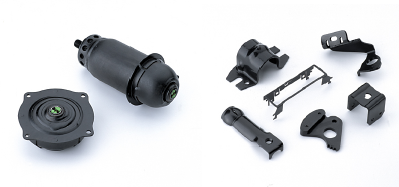Contract Number: to be announced later in 2006
Type of Project: FP6-Craft
Duration: 18 months (2004-2006)
Participants
1.Autoforese (Portugal), 2.Centro Sviluppo Materiali (Italy), 3.Cidaut (Spain), 4.Instituto Superior Tecnico (Portugal), 5.Lulea University of Technology (Sweden), 6.Micrometric (UK), 7.Plasticos Durex (Spain), 8.Teknia Manufacturing Group (Spain), 9.Tecnisata (Portugal), 10.Pyrogenesis (Greece)
Summary
This project is addressed to obtain integrated security sub-modules (constituting the suspension and steering module) in the car manufacturing industry. The final objective is to give SMEs an advantageous approach to the modularisation requirements nowadays demanded in the sector. The sub-modules are traditionally made up of a steel structure and anchorage elements (rubber-metal or plastic-metal), which undergo separate surface treatments to prevent corrosion. The elements are joined by means of adhesives and screws, at a time-consuming process stage.
This project suggests a new work methodology; the first point in its implementation will be the construction of metallic structure in high strength low alloy steel (HSLA) in order to profit from its safety performance and lower weight at affordable cost. At the following stage the improvement proposed is based on the use of laser welding as joining method, a high quality way to reduce anchorage points and to increase the resistance of the sub-module. Thus, it would achieve a completely integrated, the lighter and reliable security sub-module.
The further surface treatment of the integrated piece, where Pyrogenesis is involved, will provide an unaltered coating. Overcoming the currently need of assembly processes, which usually cause serious damages on the protective surface, will improve the corrosion resistance of the pieces. In order to be applied to the sub-module, the traditional treatment would have to be modified so as to respect the different natures of its elements, i.e., steel, rubber and thermoplastics. With regards to this aspect, it is proposed the development of an organic treatment with lower required temperatures drawing particularly the attention to the removal of pollutant elements (Cr6+, Zn and Ni) involved in traditional methods.

